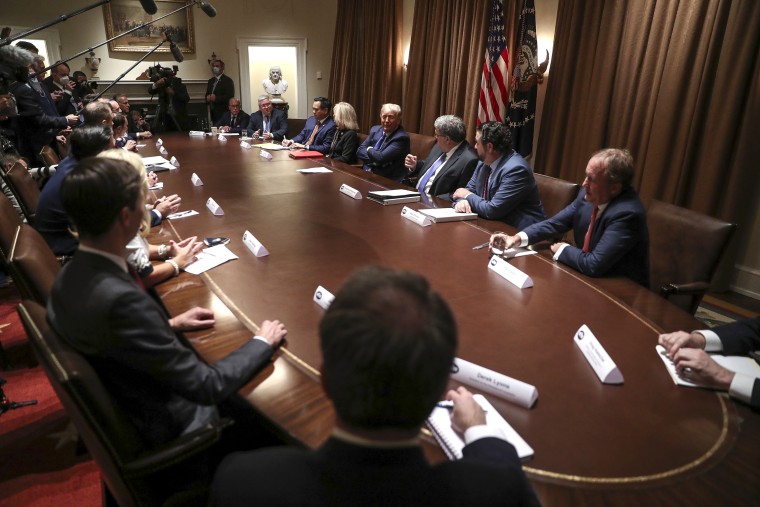For those unfamiliar with lobbying and advocacy in the nation's capital, the connection between the National Association of Manufacturers and Republican politics may not be well known. To put it mildly, the two are inextricably linked, and have been for many years. There is, as a rule, no daylight between NAM and the GOP.
Which made it that much more extraordinary yesterday when the National Association of Manufacturers urging Vice President Mike Pence to invoke the 25th Amendment to remove Trump and "preserve democracy."
Around the same time, former Defense Secretary William Cohen -- who served in Congress as a Maine Republican for many years -- also told CNBC that the cabinet should invoke the 25th Amendment to remove Trump from office.
As several dozen members of Congress push the same line -- including, as of this afternoon, one House Republican -- this isn't just idle chatter. CNN reported overnight:
Some Cabinet members are holding preliminary discussions about invoking the 25th Amendment to force President Trump's removal from office, a GOP source said. The discussions are ongoing but it's unclear if there will be enough Cabinet members to result in Trump's removal. The conversations have reached the Hill where some senators have been made aware of the discussions, the source said.
CBS News ran a similar report.
If my email inbox is any indication, there's considerable reader interest in the topic, so let's take a minute to review the basics.
Almost immediately after Trump's 2016 inauguration, chaos gripped the White House. Vanity Fair published a piece noting, "[S]ome West Wing advisers were worried that Trump's behavior could cause the Cabinet to take extraordinary Constitutional measures to remove him from office."
The article added that Steve Bannon mentioned the 25th Amendment to Trump, and the president replied, "What's that?"
Broadly speaking, the amendment is about presidential succession, and it includes language about what happens to the power of the office when a president is incapacitated. But Article 4 to the 25th Amendment also creates a constitutional mechanism in the event the president is "unable to discharge the powers and duties of his office."
Specifically, under the 25th Amendment, a sitting vice president and a majority of the cabinet could, on their own, agree to transfer power out of the hands of a sitting president. At that point, those officials would notify Congress, and the vice president would assume the office as the acting president.
And what if the challenged president wasn't on board with the plan to remove him/her from the office? As Vox explained, "If the president wants to dispute this move, he can, but then it would be up to Congress to settle the matter with a vote. A two-thirds majority in both houses would be necessary to keep the vice president in charge. If that threshold isn't reached, the president would regain his powers."
Given the circumstances, this creates a hurdle that would be tough to clear. That said, removing Trump from power, even temporarily, would offer a degree of security that doesn't currently exist.
It's worth emphasizing that the intended purpose of the constitutional provision was to address a president with a serious ailment -- say, a stroke, for example -- in which he or she is alive, but unable to fulfill the duties of the office.
It probably wasn't written to deal with a president who's succumbed to madness.
But maybe the intentions of the 25th Amendment's authors aren't paramount? Maybe what matters are the real-world conditions we find ourselves in?
Postscript: Just as an aside, The Atlantic's David Frum wrote the week after the 2016 election, "Twenty-Fifth Amendment to the Constitution. Article 4. We're all going to be talking a lot more about it in the months ahead."
Frum was clearly onto something.

